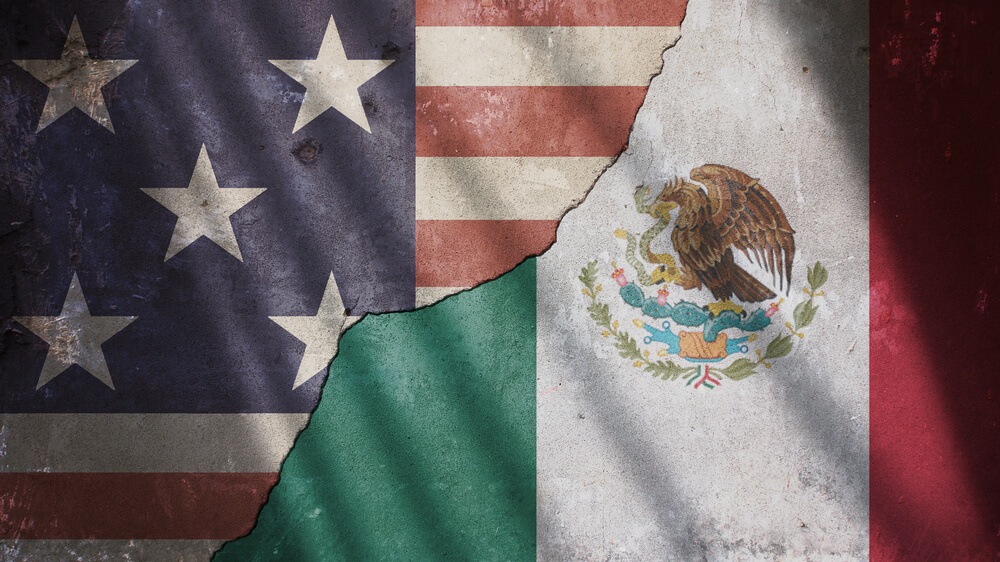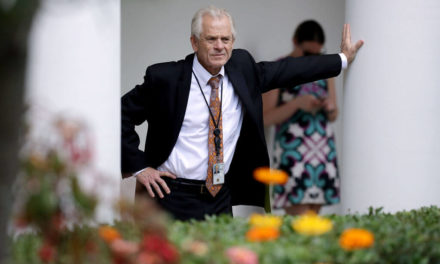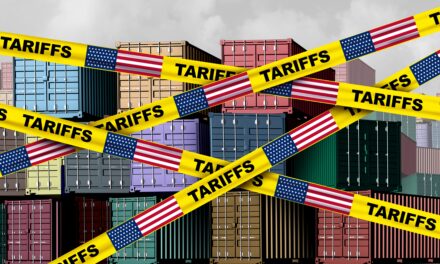Straining to stave off threatened U.S. tariffs, Mexican and American officials claimed progress in White House talks, but President Donald Trump said Thursday that a “lot of progress” must be made to halt the import taxes he is holding out as a way to force Mexico to stanch the flow of Central American migrants flooding America’s southern border.
Talks were to resume later Thursday.
Underscoring the scope of the problem, the Department of Homeland Security announced separately that U.S. Border Patrol apprehensions of migrants illegally crossing the border hit the highest level in more than a decade in May: 132,887 apprehensions, including a record 84,542 adults and children traveling together and 11,507 children traveling alone.
The threatened tariffs carry enormous economic implications for both countries, and politically they underscore a major ideological split between Trump and his party. Trump has increasingly relied on tariffs as a bludgeon to try to force other nations to bend to his will, dismissing warnings, including from fellow Republicans, about the likely impacts on American manufacturers and consumers.
Renewing his threat Wednesday, Trump tweeted from Ireland that the Washington talks would continue “with the understanding that, if no agreement is reached, Tariffs at the 5% level will begin on Monday, with monthly increases as per schedule.”
Mexican Foreign Secretary Marcelo Ebrard said immigration, not tariffs, was the main focus at the White House meeting, which included Secretary of State Mike Pompeo, Vice President Mike Pence and other U.S. officials.
“We are optimistic,” he said at a news conference at the Mexican Embassy.
Meanwhile, Republicans in Congress are threatening their own confrontation with Trump, warning the White House that they are ready to stand up to the president to try to block his tariffs, which they worry would spike costs to U.S. consumers, harm the economy and imperil a major pending U.S.-Mexico-Canada trade deal.
Without a deal, the first tariffs — 5% taxes on imports from Mexico, eventually increasing to 25% — are to go into effect next Monday, and Trump has said that is “more likely” than not to occur despite the stiff and vocal opposition from many fellow Republicans. Trump has been seething for months about the spike in migrants trying to cross the southern border and has proposed a series of increasingly radical solutions, including completely sealing the U.S.-Mexico border and renewing his controversial family separation policy.
Most of the migrants trying to enter the country are from Guatemala, Honduras and El Salvador, countries wracked by gangs, violence and poverty. Many of the travelers are expected to eventually request asylum.
Administration officials have said Mexico can prevent the tariffs by securing its southern border with Guatemala, cracking down on criminal smuggling organizations and entering into a “safe third country agreement” that would make it difficult for those who enter Mexico from other countries to claim asylum in the U.S.
The U.S., however, has not proposed any concrete benchmarks or metrics to assess whether Mexico is sufficiently stemming the migrant flow from Central America. And it is unclear whether even those steps would be enough to satisfy Trump on illegal immigration, a signature issue of his presidency and one that he sees as crucial to his 2020 re-election campaign.
Heading into the meeting, which Mexico requested, White House officials had downplayed expectations, saying the U.S. delegation was willing to listen to Mexico’s ideas for meeting Trump’s demands, but did not expect a deal to emerge Wednesday.
And it remained unclear what kind of deal could be struck with Trump out of the country.
Nonetheless, some Republican lawmakers who have been in talks with officials from both countries were increasingly hopeful a proposal could be reached that would satisfy Trump, or least delay the tariffs and buy more time.
GOP Sen. Ron Johnson of Wisconsin said Wednesday he called the Mexican ambassador to underscore that Trump was “serious” about the tariffs and that it’s unclear if Congress would be able to muster enough votes to block them.
“I just wanted to make sure the Mexican ambassador realized” the situation, Johnson said. “If he enacts those tariffs, they’re not going to be overridden.”
Offering optimism, White House trade adviser Peter Navarro said on CNN that there were commitments Mexico could make to avoid the tariffs, which he said “may not have to go into effect precisely because we have the Mexicans’ attention.”
And Republican Chuck Grassley of Iowa, chairman of the Senate Finance Committee, said before the White House meeting that the Mexicans had “a long list of things they’re going to offer to us, and it will preclude tariffs going into effect.”
Analysts, however, were not optimistic that the initial phase of tariffs could be avoided.
“Trump has got his new tool and he wants to use it and he will use it … because it’s part of his negotiation tactics,” said Duncan Wood, director of the Mexico Institute at the Wilson Center think tank in Washington.
“Mexico will offer to do a lot more on migration, but they will also say that they will retaliate against tariffs and a lot of people are going to lose a lot of money,” he said.
Tony Wayne, a former U.S. ambassador to Mexico, said the two sides could have a good meeting and reach a deal, but still not satisfy the “wild card” president.
“The tweets have said ‘stop everybody’ and ‘stop drugs.’ That would be an impossible task to do in the near term,” he said.
The stakes are clear: The 25-year-old North American Free Trade Agreement made trade with Mexico largely duty-free. As a result, manufacturers have built up complicated supply chains that straddle the border. Americans bought $378 billion worth of Mexican imports last year, led by cars and auto parts. Mexico is America’s No. 2 export market behind Canada.
The back-and-forth could also imperil the NAFTA revamp, which Trump pressured Mexico and Canada to agree to last year. The U.S.-Mexico-Canada Agreement has been signed by all three countries but must be approved by their legislatures.
© The Associated Press. All rights reserved.




